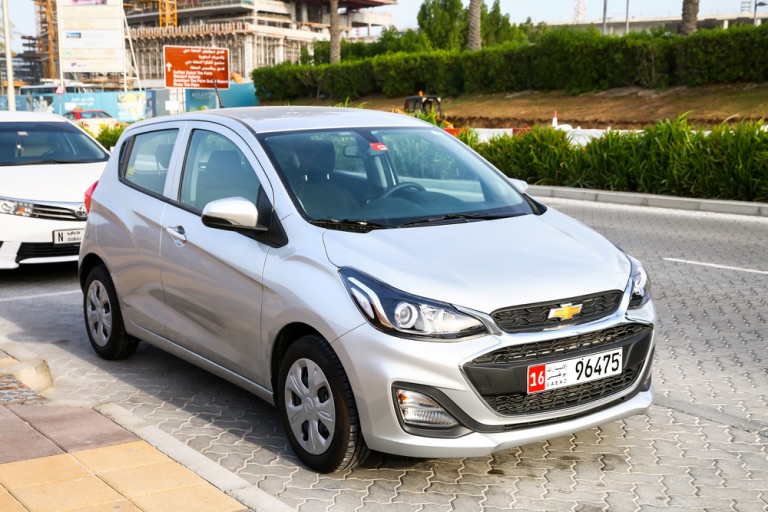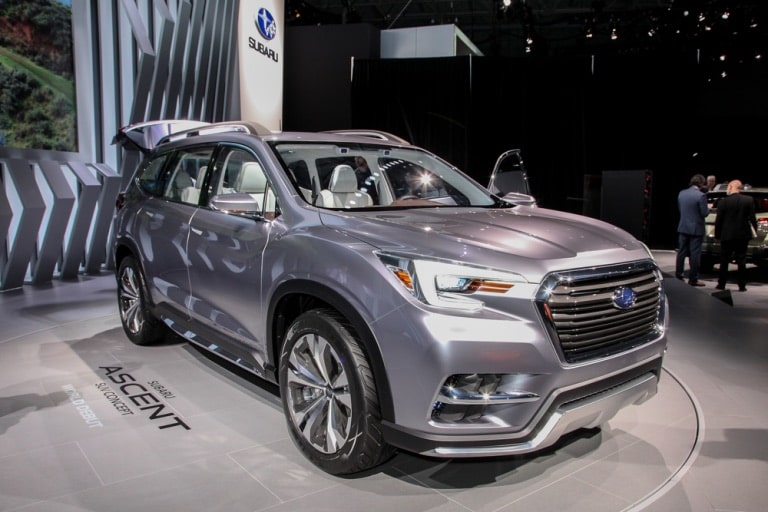Have you ever wondered “how much does a car weigh”? Yeah, we haven’t either. We all know that machines we see on the road are heavy, but does it really matter to know exactly how much they weigh?
As it turns out, it does matter. A car’s weight affects everything from safety ratings to fuel consumption and every other small factor in between.
For that reason, we are going to discuss different types of car weights and how you can find out how much your vehicle weighs.
Different Types of Car Weights
Since it doesn’t usually come up in everyday conversations, many people are surprised to find out there are different working definitions of car weight.
These different definitions come from the fact that various factors can contribute to how much a car will weigh. Some of those factors include materials your car is made out of, the engine as well as vehicle size.
So, there are many ways to calculate your vehicle’s weight. But the most usual ones are:
- Curb Weight (CW) — a metric that carmakers usually use; it is the weight of a vehicle without the passengers, cargo, or any additional equipment
- Gross Vehicle Weight (GVW) — GVW is the Curb Weight but with passengers, cargo, and added equipment
- Gross Vehicle Weight Rating (GVWR) — refers to the maximum weight a vehicle can carry, including all weight sources, without compromising the safety
- Payload — the term refers to any weight your vehicle is towing, including vehicle weight, passengers, cargo, equipment, or anything else in it
- Gross Combined Weight — the metric used to calculate your vehicle’s weight, trailer’s weight, and any cargo inside them
- Maximum Loaded Trailer Weight — measurement used to describe a weight of a vehicle as well as a trailer that is loaded to a full capacity
- Gross Axle Weight — the weight each axle can carry as a set, front and back
- Gross Axle Weight Rating — the weight every axle can carry
How Much Does the Average Car Weigh?
According to the US Environmental Protection Agency (EPA), the average weight of a car in 2021 is 4,094 pounds, which is a bit less than 2020. Furthermore, for smaller cars, the average is 2,660 pounds.
An example of such a car would be a Honda Civic with a weight of 2,771. On the other hand, the average for bigger ones is 4,400 pounds, like the Subaru Ascent, which is 4,430 pounds.

Honda Civic
Subaru Ascent
The Lightest Cars You Can Find in the US Market
In the US, people tend to buy heavier cars compared to other countries. For instance, Honda Fit is one of the lightest new cars in America, with its 2,500 pounds.

Honda Fit
Other lighter cars on the US market in 2021 include Nissan Versa with 2,599 pounds, the Mazda MX-5 Miata with 2,341 pounds, the Chevy Spark weighing 2,246 pounds, and the Toyota Yaris with 2,822 pounds.

Chevy Spark
The Heaviest Cars on the US Market
Americans tend to buy more SUVs, CUVs, and trucks. However, the heaviest cars are not just SUVs, as you might have assumed, but there are also others like the Mercedes-Maybach S560 4 Matic sedan with 5,000 pounds. Another example is the Ford Expedition that weighs over 5,300 pounds.

Ford Expedition
The Cadillac Escalade ESV SUV, at 5,993 pounds, the Chevrolet Suburban 3500 HD with staggering 6,585 pounds, and the Toyota Sequoia SUV with more than 5,700 pounds are among the heaviest you can find on the market.

Toyota Sequoia
What Are the Heaviest and the Lightest Cars Ever Made?
The heaviest car made so far is the 2017 Mercedes-Maybach S600 Pullman Guard. This car is a fully armored limousine with an incredible weight of 11,244 pounds.

Mercedes-Maybach S600
Then again, the lightest car ever made was so light you could basically pick it up and carry it home if you ever ran out of gas. We are, of course, talking about the 1960’s cute little Peel P50 with a weight of only 130 pounds.

Peel P50
The Weight Difference Between Electric and Gas Cars
You probably already know that electric cars are much heavier than their gasoline-powered counterparts. Some examples include the Tesla Model S with a Curb Weight of 4883 pounds and the Audi e-tron with a baffling 6000 pounds.

Tesla Model S

Audi e-tron
The reason why electric vehicles are so heavy is because of the batteries. Battery banks are simply enormous, with one weighing over 500 pounds. Just for the comparison, let’s say your car has a 15-gallon gas tank. If you filled it up, the tank would weigh about 100 pounds, which makes for a significant weight difference.
Why Is It Necessary to Know Your Car’s Weight?
By now, we have learned that there can be a massive difference in weight between various cars. Also, we have seen that there’s more than one way to measure your vehicle’s weight. But is it important that you know how much your car weighs? In fact, it is, for several reasons.
1. Auto Safety
Learning your car’s weight means a serious advantage when it comes to safety. The general rule is that smaller cars have a disadvantage compared to larger and heavier vehicles in the case of a collision. In fact, for every 1000 pound drawback, the risk of fatality increases by 47%.
So, if you are driving a heavy car, let’s say a 6000 pound Lexus, this will turn out to be good if you ever get into an accident. Heavier cars are safe and sturdy, absorb damage better, and are less likely to flip or roll over. Moreover, if another vehicle clips you, you probably won’t spin across the road for a long distance.
On the other hand, if you are driving a lighter car, such as a Toyota Yaris, imagine what would happen if you collided with a vehicle three times heavier. The results could be catastrophic.
Furthermore, there are bridges that have weight limits. It would be wise to be aware of how much your vehicle weighs before crossing them.
2. Routine Maintenance and Tool Selection
When buying a new car, not many of us consider maintenance costs, and even fewer take into account maintenance ability. But even for something as simple as a tire change, it’s essential that you know your car’s weight.
Let’s say your tire blows in the middle of a highway. A Yaris owner will have a much easier time changing the tire by themselves than a Lexus owner. Jacking up a 6000-pound vehicle on the side of a highway requires different tools and a lot more skill. For a Lexus, you’ll need sturdier equipment and more caution since your car is handling a lot of weight.
Therefore, it’s important to pick the right tools that can support your car’s weight when you are doing routine checks and maintenance.
3. Fuel Economy and Emissions
The fuel economy is definitely the biggest reason car drivers want to know their car’s weight. And that makes sense since the weight will affect how the vehicle performs and the financial cost you’ll face. In general, for every 100 pounds you cut off the weight, you can increase the fuel efficiency by 1 – 2%.
So, the heavier the car, the more an engine needs to work to get it moving. Moreover, it emits more carbon into the atmosphere. On the other hand, a lighter car has better fuel efficiency and lower carbon emission, but there are safety concerns. That’s quite a dilemma, we know.
But the one thing you can do, no matter your car’s curb weight, is to get rid of all the junk and unnecessary cargo from your trunk and back seat. This way, you can lower your car’s weight and gas consumption.
4. Payload
It’s also good to know the maximum load your car and trailer can handle to avoid overburdening them. An overloaded vehicle will suffer greater wear and tear damage and at a faster rate.
5. Buying a New Car
When buying a new car, you should always check its weight, so you don’t go over the Gross Vehicle Weight Rating [GVWR] in your state.
How to Learn Your Car’s Weight
So, we’ve learned that it’s important to know your car’s weight so you can keep yourself and other drivers safe. Now it’s time to list some ways you can check how much your vehicle weighs.
1. Check the Owner’s Manual
In your car’s manual, go to the specifications part. You should be able to find the vehicle’s curb weight there. If you don’t own a manual, you can get a copy online, although it might cost you a couple of bucks. In any case, we strongly recommend acquiring a manual since it might come in handy for other things in the future.
2. Check the Door on the Driver’s Side
On the door frame on the driver’s side, there’s a sticker that shows the Gross Vehicle Weight Rating (GVWR). Sometimes, the sticker also states the Curb Weight.
3. Reach Out to the Manufacturer
To learn your car’s weight, you can always call the manufacturer and ask. However, you’ll probably have to provide the following information about your vehicle: year, model, make, and identification number. So, you might want to check those in advance.
Another option is to go to the manufacturer’s website and search for the car’s specifications. You should be able to find out your vehicle’s Curb Weight there.
4. Go and Get Your Car Weighed
The most accurate way to find out how much your car weighs is to find a car scale. For example, you can go to a junkyard or a car inspection center. The staff there can measure your car’s Gross Vehicle Weight using a car scale.
Should You Choose a Lighter or a Heavier Car?
We have seen that the car’s weight affects many factors, from fuel efficiency and carbon emission to your general safety. So, naturally, one question arises: Should you buy a car that weighs less or more?
Basically, it all depends on what you value the most and what you need out of your vehicle. A lighter car will save you money but will present a higher risk if you ever get into a car accident with a much heavier vehicle. At the same time, a heavier car is not very environmentally or cost-friendly.
Furthermore, do you want an electric or gasoline car? Electric cars are heavier as well as eco-friendly, so that might affect your decision.
If you are on the road all the time, commuting to work every day, or frequently traveling long distances, you need reliability and endurance. So, it might be best to choose a heavier car. A heavy vehicle might also come in handy if you ever get into a car accident.
On the other hand, if you travel often, you might want a lighter car since it’s more cost-effective and doesn’t do as much damage to the planet.
In the end, you must carefully calculate all the risks and benefits to find a solution that works for you.
Final Thoughts
To sum up, there are many ways to refer to car weight. So, when searching for information about your car, you should know exactly what you want — a Curb Weight, Gross Vehicle Weight, or something else.
If you were wondering why you should bother learning your vehicle’s weight, here are some of the reasons. There can be a huge difference in weight between your car and the ones you pass by on the road. Hence, for safety reasons it’s helpful to know whether your car is among the heavier or lighter ones. Heavy cars have an advantage in case of a collision.
On the other hand, if you are concerned with fuel economy, finding out your car’s weight will help you calculate potential costs. Moreover, you will have a clear picture of your car’s carbon emissions.
So, if you are interested in discovering this information, you can do it in a couple of ways. You can start by checking the owner’s manual and the sticker on the driver’s door. Also, you can contact the manufacturer or have your car weighed.
All in all, it won’t take up too much of your time to find out the answer for how much does a car weigh, but this information might help you save money or even your life.


